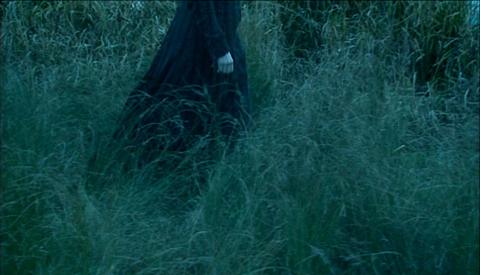English 207
Big Books of American Literature: Alchemies of Mind
Bryn Mawr College
Spring 2006
Day One
Write what you see.
What you feel.
What you think.

What did you think you should be seeing, feeling, thinking...?

From the Watercolors of Sharon Burgmayer
Comparing notes: what did we see/feel/think/think we should be...?
"..for all the expressive freedom of literature, there is virtually no written equivalent of abstract expressionism...arrays of words seemingly disconnected from any reference to the real world. Or think of the vast difference between
literature and what psychiatrists call "word salad," random chaotic verbalizations..." (Barash and Barash, Madame Bovary's Ovaries, p. 11)
A "taste" of what's to come:
the experiential, the comparativist, the exploratory, the revisionist...
this is a course about experience, not judgment
(about direct? unmediated? experience? is that possible?)
about reading out of your experience, adding to it with others', getting a fuller picture
the painting is a representation; our stories of the painting are further representations, productive of further stories/representations...
the point is not to end/preserve the story, but to produce more/better/fuller ones...
an evolutionary process
American literary canon is a selection out of a huge range of particular stories,
which we use to make sense of our own lives;
which we can also re-write/use to remake the future
this is why we read the books we do
since I began reading American literature in the '60's,
the field has recognized our need to learn a far broader range of conventions, histories, subjects...
and I have done nothing since them but examine the limits of my training,
as Am Lit expanded to give access to all living cultures of 21st century America
these professional changes were rooted in movements for racial justice and sex equity
they aimed to present an accurate picture of development of the (literary) cultures of the U.S.
for a couple of years, I taught Northamerican Migration Narratives
(Jewish-, African-, Lakota-, Japanese-, Mexican-American texts)
no "Great River" theory of literature, no mainstream
(a fundamentally misleading model for heterogenous society)
need comparativist model, accounting for multiple streams
(Bethany Schneider's Native American lit, Juana Rodriguez's Chicana lit,
Linda-Susan Beard's African and African American lit, Theresa Tensuan's Asian American courses)
during our last search, for Bethany, I volunteered to go back and
read interrogatively/critically the Big Old Books I first fell in love with:
not to give you a map to territory, but
inviting you to re-trace/explore with me what these great/grand old books tell us:
why they were written, where they came from,whether we should keep on reading them--
and what stories we are telling about ourselves if we do
really an open experiment:
in this world of multiple texts: which few to choose?
interested in your thinking independently about them:
what you see/how you feel when you read them: what they do to you
art helps form us as social beings
Coupla points...
History of course: derives from (at least) three tributaries






